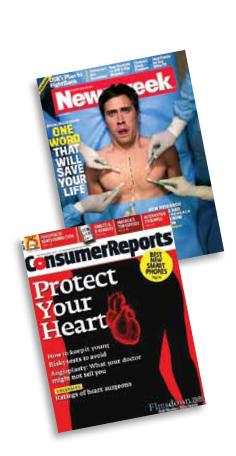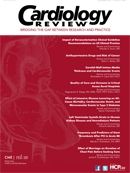Publication
Article
Cardiology Review® Online
Just Say No?
Author(s):

ccording to recent articles in Newsweek (August 22 & 29, 2011) and Consumer Reports (September 2011), “No” may be the word patients should use more frequently— as in, “No, I don’t want to have that diagnostic test.” Newsweek quotes several prominent physicians who themselves have chosen to forgo screening tests like mammograms, PSA, and EKGs in the belief that, most of the time, they lead to a “dangerous odyssey of tests and procedures” that can result in a cascade of events creating unnecessary anxiety, procedures, and expense. “Less is more,” say these doctors.
Cardiology was singled out as having the most “disturbing”—and expensive— overuse of interventions that don’t improve survival rates or quality of life any more than making lifestyle changes. An analysis of at least five large, randomized controlled studies of stable heart patients with mild chest pain found that angioplasty, stenting, and bypass surgery did not improve survival rates or quality of life more than noninvasive procedures such as medications, exercise, and a healthy diet.
Cleveland Clinic cardiologist Steven Nissen, MD, points out that we spend almost twice as much per capita on health care [as other developed countries] but can show no gain in health or longevity. While many medical advances have saved lives and prevented suffering for millions, some of the same health care that helps certain patients can be useless or even harmful when offered on a huge scale.
Angioplasty comes in for particular criticism. “Many of the 500,000 elective angioplasties performed each year are done on patients who could benefit more from drugs, exercise, and healthy eating,” writes Newsweek. Cardiac CT angiography, introduced a decade ago to screen for cardiovascular disease, provides such detailed images that doctors are seeing things that were previously hidden and feeling as if they should do something. But NIH cardiologist Michael Lauer, MD, cautions that being able to see vivid detail doesn’t mean that doctors know whether or not they need to intervene.
Consumer Reports goes even further, asserting that “cardiac care is a moneymaking machine that too often favors profit over science.” There’s no argument that when performed within hours of an MI to clear a blockage, emergency PCI and stenting is a lifesaver. But in nonemergency situations, it doesn’t prolong life better than medical therapy, and it triggers heart attack in 1% to 2% of patients. And rates of the procedure have increased 300% in the last decade.
With millions of Baby Boomers hitting their 60s and heart disease still the number-one killer of US adults, direct-to-consumer advertisements are appearing around the country, encouraging people to worry about their hearts—and get CTs and heart scans, which aren’t covered by most insurers. Kimberly Lovett, MD, of Kaiser Permanente and the University of California, San Diego School of Medicine, suggested that inappropriate testing can lead to inappropriate treatments. “Direct to consumer cardiac testing may pose more harm than benefit,” she says.
A Consumer Reports investigation concluded that angioplasty is overused; that patients often get the wrong cardiac tests and have too little information and understanding about the tests they’re signing on for; and that doctors often do not follow the latest practice guidelines. Finally, the report criticizes the “tendency to tackle heart disease with a $10,000 procedure before running a simple test or prescribing an inexpensive generic medication.”
